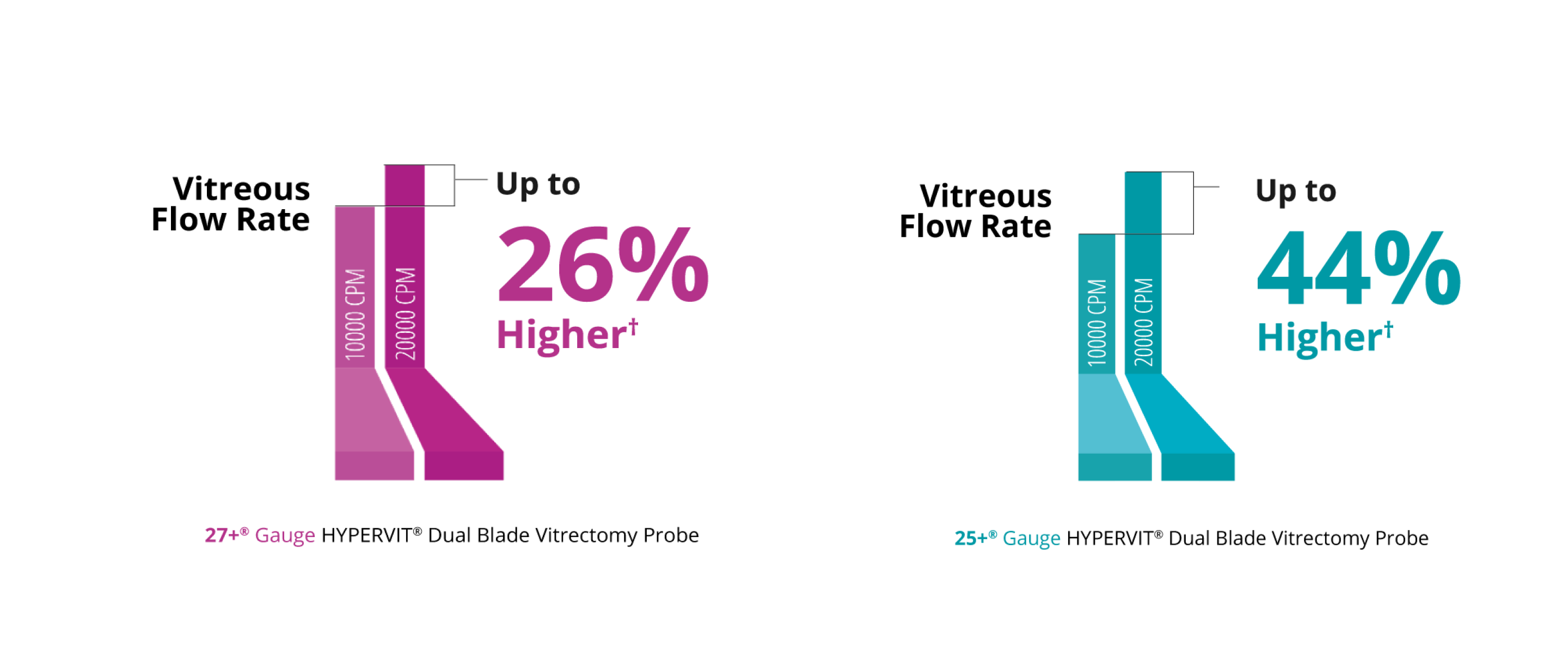THIS IS CONTROL.
This is the CONSTELLATION® Vision System.
THIS IS CONTROL.
This is the CONSTELLATION® Vision System.
CONSTELLATION® is designed to help you achieve what you’ve never imagined.*

*Please refer to CONSTELLATION® Operator's Manual.

Surgical Efficiency with Advanced ULTRAVIT®, HYPERVIT® and OZil®1-4
CONSTELLATION® helps you achieve efficiency you’ve never imagined in vitrectomy and combined surgeries.


HYPERVIT®


ULTRAVIT®


OZil®
Increased Vitreous Flow Rate
Increase vitreous flow with the dual-pneumatic drive of the HYPERVIT® Dual Blade Bevel vitrectomy probe and the Advanced ULTRAVIT® Bevel vitrectomy probe, with their optimised (and surgeon-regulated) duty cycles.1,5
Enhanced Emulsification and Followability
Experience enhanced lens substance emulsification ability, improved followability and an improved thermal safety profile in cataract procedures with OZil® Torsional technology.2,4,6-8*
*Compared to microburst longitudinal phacoemulsification


Procedural Versatility with Bevel Tip Vitreous Cutter9
CONSTELLATION® helps you achieve versatility you’ve never imagined in vitrectomy surgeries.


HYPERVIT®


ULTRAVIT®


27+® and
25+® Gauge
Superior Surgical Versatility with Bevel Tip Design†
The Advanced ULTRAVIT® and the HYPERVIT® probes both feature a bevel tip design, which allows for closer proximity to the retina and improved access to the tissue plane for superior surgical versatility.9†
Bevel tip design facilitates improved access to the tissue plane9




† Advanced Ultravit® 10K Beveled Vitrectomy Probe and HyperVit® Dual Blade Vitrectomy Probe compared with ULTRAVIT® Probe.
A Complete Portfolio for Every Step of the MIVS Procedure
Alcon offers a complete 25+® / 27+® gauge portfolio for improved stiffness during surgery, as well as linear incisions and optimised wound closure with the EDGEPLUS® blade.10-12*
*Compared to conventional 25G & 27G portfolio.




Fluidics Stability with IOP control in combination with HYPERVIT® and Advanced ULTRAVIT®13-16
CONSTELLATION® helps you achieve fluidics stability you’ve never imagined in vitrectomy surgeries.
Reduced Pulsatile Traction for Stability During Surgery
CONSTELLATION® Vision System’s IOP compensation enables stable, closed-system intraocular surgery when combined with valved cannulas and the HYPERVIT® or the Advanced ULTRAVIT® probe.13,16,17
Consistent IOP Control with CONSTELLATION®
CONSTELLATION® features a proprietary non-invasive flow sensor technology by Alcon, which enables the surgeon to maintain IOP to ± 2 mmHg.18 CONSTELLATION® compensates for and provides control of infusion pressure, while also offering simultaneous irrigation and infusion.13


Modern Surgery with NGENUITY® and V-LOCITY® Integration19*
CONSTELLATION® helps you achieve what you’ve never imagined with a modern and simplified surgical workflow.
Digitally Assisted Surgery with NGENUITY®
Enhance the surgical experience with DATAFUSION™ integration of the NGENUITY® 3D Visualization System.*
Surgeons can operate NGENUITY® through the CONSTELLATION® Vision System to monitor real-time IOP, flow rate, cutting speed, laser and other surgical parameters, and view integrated image profiles in the CONSTELLATION® procedural workflow.
- Maintain sharp focus with up to 5X extended depth of field20*
- Amplify surgical view with up to 48% increased magnification20*
- Resolve fine details with up to 42% increased depth resolution20*
*Compared to a standard analogue Microscope

Seamless Laser Operation
Control all laser parameters from the CONSTELLATION® Vision System with the Embedded PurePoint® 532nm Laser*, allowing for enhanced ease of use and efficiency through RFID and voice control.
The PurePoint® Laser is compatible with a full line of laser probes and accessories, including the VEKTOR™ Articulating Illuminated Laser Probe for unassisted scleral depression, and the Laser Indirect Ophthalmoscope (LIO) for efficient laser delivery with comfort.*

Improved Operating Room Turnover
Increase operating room turnover by 39%* with V-LOCITY® Efficiency Components, which enables19:
- Automated surgeon-controlled Fluid/Air Exchange (F/AX)*
- Automatic recognition of each device connected to EnGauge® RFID*
- Elimination of setup errors with colour coordinated and keyed connectors*
- Silicone oil injection and extraction with the CONSTELLATION® Viscous Fluid Control Pack*

*Compared to Accurus. Please refer to CONSTELLATION® Operator's Manual.
A History of Innovation
The CONSTELLATION® Vision System continues to evolve, delivering vitreoretinal technologies that will shape tomorrow.

Alcon Services
Supported by World-Class Service Centered on You


Reach
A Large Service Network
1000+ Clinical and technical
experts worldwide


Expertise
Experienced Specialists
Alcon Technical Specialists
100+ Hours of training and certification
Alcon Clinical Specialists
15+ Years of ophthalmic and medical experience


Partnership
Training & Collaboration
Every Step of the Way
Installation
Training
Ongoing Support
Clinical Support
Instructions for Use (IFU)
For a full list of indications, contraindications and warnings, please visit ifu.alcon.com and refer to the relevant product’s instructions for use.
References
1. Alcon Data on File, REF-00405, 2018.
2. Vasavada AR. Comparison of torsional and microburst longitudinal phacoemulsification: a prospective, randomized, masked clinical trial. ASCRS Presentation. April 28-May 2, 2007.
3. Davison J. Cumulative tip travel and implied followability of longitudinal and torsional phacoemulsification. J Cataract Refract Surg. 2008;34:986-990.
4. Fernández de Castro LE, et al. Bead-flow pattern: quantization of fluid movement during torsional and longitudinal phacoemulsification. J Cataract Refract Surg. 2010;36(6):1018-1023.
5. Alcon Data on File, REF-01981, 2017.
6. Han Y, et al. Heat production: longitudinal versus torsional phacoemulsification. J Cataract Refract Surg. 2009;35:1799-1805.
7. Jun B, Berdahl JP, Kim T. Thermal study of longitudinal and torsional ultrasound phacoemulsification: tracking the temperature of the corneal surface, incision and hand piece. J Cataract Refract Surg. 2010;36(5):832-837.
8. Zacharias J. Thermal characterization of phaco probes operated in torsional and longitudinal modalities using alternative methodologies. ASCRS Presentation. 2011. San Diego, CA.
9. Alcon Data on File, REF-03769, 2017.
10. Alcon Data on File, REF-03559, 2009.
11. Avery R. Single surgeon experience with an enhanced 25+ vitrectomy probe/entry system. ASCRS Poster, 2009.
12. D. Esmaili. Valved Cannula Systems. Retina Today, 2012.
13. Riemann C, et al. Prevention of intraoperative hypotony during vitreoretinal surgery: an instrument comparison. ASCRS. Poster Presentation, 2010.
14. Chu TG, Buboltz DC, Abulon DJ. Comparison of aqueous flow rates with two commercially available vitrectomy systems. ARVO Poster Presentation, 2010.
15. Buboltz DC. New method for evaluating flow rates and intraocular pressures during simulated vitreoretinal surgeries. ARVO Congress Poster Presentations, 2010. Fort Lauderdale, FL.
16. Irannejad A, Tambat S, Abulon DJK. Retropulsion and mass flow of 27-gauge vitrectomy probes: comparison of dual-blade/flat-tipped probes and single-blade/beveled probes. Poster presented at: 18th Congress of the European Society of Retina Specialists; September 20 –23, 2018; Vienna, Austria.
17. Alcon Data on File, REF-00404, 2018.
18. Kaiser P. Advanced vitreous cutter offers duty cycle control. Retinal Physician, 2009.
19. Alcon Data on File, REF-06783, 2008.
20. Alcon Data on File, REF-00389, 2017.
Please refer to relevant product operator’s manual for complete list of indications, contraindications and warnings.





